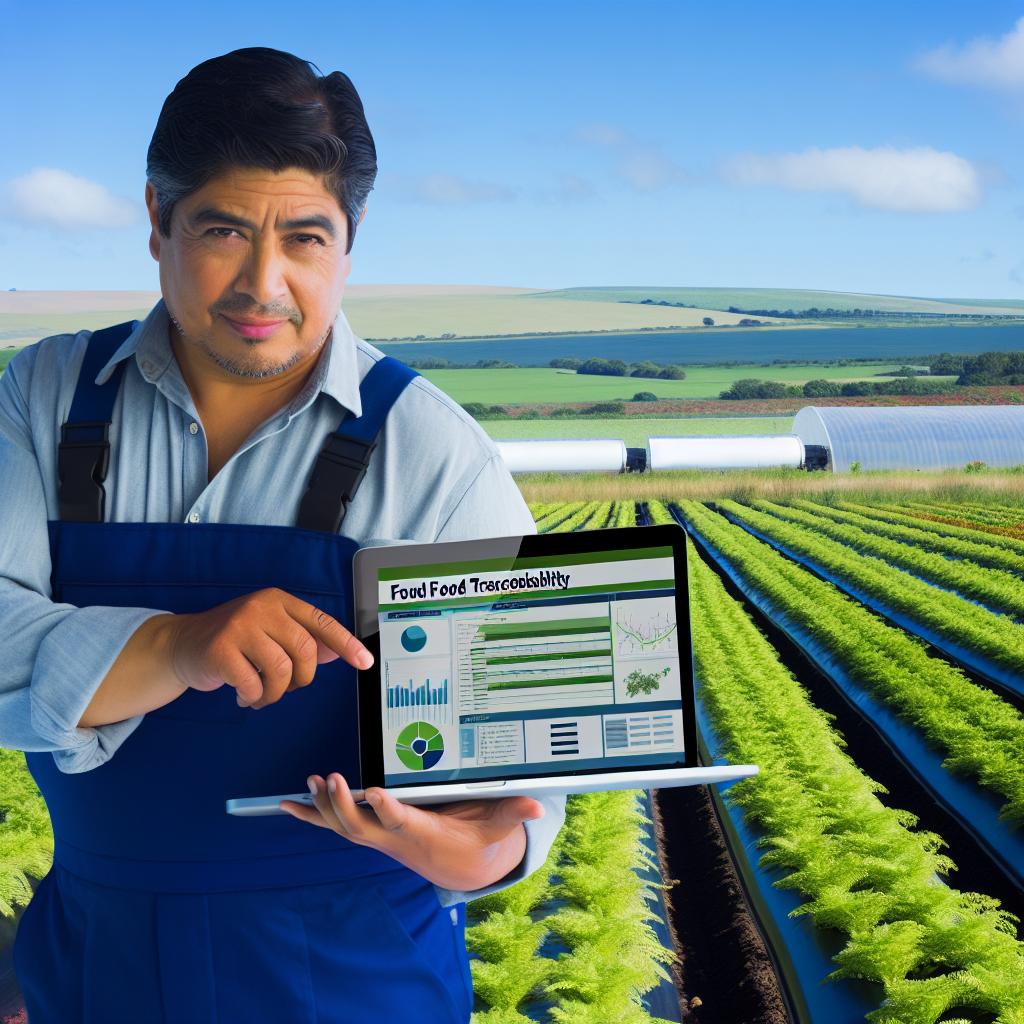Introduction to Food Traceability in Organic Farming
Food traceability plays a crucial role in organic farming standards.
It ensures that every component of food production is monitored.
This process allows for tracking products from farm to table.
Traceability builds consumer confidence in food safety.
Furthermore, it supports compliance with organic regulations.
Importance of Transparency
Transparency is vital for maintaining organic integrity.
Consumers demand to know the origin of their food.
Traceability provides a clear picture of farming practices.
It helps verify that organic standards are met consistently.
Enhancing Food Safety
Food traceability significantly enhances food safety measures.
In the event of a contamination issue, tracing products is essential.
This quick response minimizes health risks to consumers.
Traceability systems allow for efficient product recalls.
This serves to protect public health and maintain brand reputation.
Boosting Market Opportunities
Traceability opens new market opportunities for organic farmers.
Transform Your Agribusiness
Unlock your farm's potential with expert advice tailored to your needs. Get actionable steps that drive real results.
Get StartedRetailers and consumers increasingly seek verified organic products.
This demand can lead to higher prices and increased sales.
Farmers that adopt traceability practices can differentiate themselves.
As a result, they gain a competitive edge in the market.
Understanding Organic Farming Standards and Regulations
Defining Organic Farming
Organic farming emphasizes sustainable practices and natural resources.
It prohibits synthetic chemicals and genetically modified organisms.
The main goal is to produce food that is healthy and environmentally friendly.
Key Regulations Governing Organic Farming
Various regulations ensure that organic farms adhere to required standards.
The USDA oversees organic certification in the United States.
This certification guarantees products meet specific organic criteria.
Farmers must comply with regulations regarding soil management, pest control, and crop rotation.
The Importance of Traceability
Food traceability is crucial for maintaining organic integrity.
It allows consumers to verify the authenticity of organic products.
Traceability systems track the product journey from farm to table.
They help in identifying sources of contamination if issues arise.
Implementing Traceability Systems
Producers must establish effective traceability systems to comply with regulations.
These systems include documentation of inputs, processes, and outputs.
Farmers often use technology to streamline data collection and reporting.
Such technology can include QR codes and blockchain for transparency.
Benefits of Food Traceability
Traceability enhances consumer confidence in organic products.
It improves supply chain efficiency by preventing potential losses.
Additionally, it supports the organic brand value in the market.
Challenges in Implementing Organic Standards
Producers face various challenges in meeting organic standards.
Some challenges include the costs of certification and compliance.
Showcase Your Farming Business
Publish your professional farming services profile on our blog for a one-time fee of $200 and reach a dedicated audience of farmers and agribusiness owners.
Publish Your ProfileMoreover, access to organic inputs can be limited in certain regions.
Producers must also navigate the complexities of record-keeping.
The Role of Traceability in Ensuring Product Authenticity
Food traceability plays a crucial role in organic farming standards.
It ensures that consumers receive genuine organic products.
This verification process builds trust among consumers.
Additionally, it helps farmers maintain quality assurance.
Establishing a Transparent Supply Chain
Traceability provides a clear view of the production process.
Consumers can track a product’s journey from farm to table.
This transparency increases accountability within the supply chain.
Moreover, it allows for quick identification of any contamination issues.
Supporting Regulatory Compliance
Many regions have strict regulations for organic standards.
Traceability ensures compliance with these regulations.
Farmers must document every step of the food production process.
This documentation serves as evidence during inspections.
Enhancing Consumer Confidence
Consumers increasingly seek assurance about their food choices.
Food traceability offers proof of organic integrity.
By showing where and how products are grown, consumer trust grows.
This trust translates into brand loyalty and repeat purchases.
Facilitating Market Access
Traceable organic products can enter various markets easily.
Many retailers prefer products with verified traceability.
As a result, farmers can access a broader range of customers.
This access often leads to improved sales and profitability.
Implementing Effective Traceability Systems
Farmers should adopt technology to track their products.
Barcode systems, RFID tags, and blockchain technology are effective tools.
These systems simplify the process of gathering data.
Ultimately, they enhance the accuracy of traceability efforts.
Gain More Insights: Best Practices for Local Food Sourcing on Farms
Benefits of Food Traceability for Consumer Trust and Safety
Enhancing Consumer Confidence
Food traceability builds consumer trust in organic farming practices.
It assures customers that their food is sourced responsibly.
When consumers know the origin of their food, they feel more secure.
This transparency fosters loyalty towards organic brands.
Ensuring Food Safety
Traceability allows for quick responses to food safety issues.
In case of contamination, it helps identify the source rapidly.
With an effective traceability system, recalls are more efficient.
This minimizes health risks to consumers significantly.
Encouraging Responsible Practices
Food traceability promotes accountability among producers.
It requires farmers to adhere to strict organic standards.
Consumers can track production methods and practices easily.
This encourages sustainable and ethical farming practices.
Strengthening Supply Chain Integrity
Traceability systems enhance supply chain transparency.
Showcase Your Farming Business
Publish your professional farming services profile on our blog for a one-time fee of $200 and reach a dedicated audience of farmers and agribusiness owners.
Publish Your ProfileThey allow stakeholders to verify each stage of food production.
This verification reinforces the reliability of organic labels.
Moreover, it deters fraudulent practices in organic farming.
Facilitating Consumer Education
Traceability empowers consumers with knowledge about their food.
It provides insights into farming methods and sustainability efforts.
This education promotes informed choices among buyers.
Ultimately, it encourages a healthier lifestyle aligned with organic values.
Learn More: Effective Communication in Community Supported Agriculture
Traceability’s Impact on Sustainable Farming Practices
Enhancing Transparency in the Supply Chain
Traceability improves transparency throughout the food supply chain.
This transparency helps consumers make informed choices.
Furthermore, it builds trust between farmers and consumers.
For example, knowing the origin of produce assures quality and safety.
Support for Compliance with Organic Standards
Food traceability ensures compliance with organic farming standards.
Certification bodies require clear records of farming practices.
By maintaining traceability, farmers can validate organic claims.
This can lead to increased market access and consumer confidence.
Facilitating Sustainable Practices and Innovation
Traceability fosters sustainable farming practices.
It enables farmers to monitor and reduce environmental impacts.
For instance, tracking inputs can minimize chemical usage.
Moreover, farmers can innovate by analyzing supply chain data.
Responding to Food Safety Concerns
Traceability plays a vital role in enhancing food safety.
In the event of a contamination, quick response is crucial.
Traceability allows for rapid identification of affected products.
Consequently, this minimizes health risks to consumers.
Promoting Local and Organic Partnerships
Strong traceability systems encourage local sourcing.
Farmers can showcase partnerships with local businesses.
This strengthens community ties and supports local economies.
In addition, it enhances the marketability of organic products.
Learn More: Effective Crop Selection Strategies for CSAs
Challenges in Implementing Food Traceability Systems
Technological Barriers
Many farms struggle with outdated technology.
This creates complications in tracking produce accurately.
Integrating new systems can be overwhelming and costly.
Additionally, farmers may lack the necessary training.
Consequently, they may hesitate to adopt new solutions.
Cost of Implementation
The financial burden of traceability systems is significant.
Small farms may find expenses particularly burdensome.
Certain technologies require ongoing maintenance and updates.
Moreover, initial setup costs can deter farmers from proceeding.
This leads to a reluctance to invest in traceability.
Regulatory Compliance
Navigating complex regulations can be challenging.
Showcase Your Farming Business
Publish your professional farming services profile on our blog for a one-time fee of $200 and reach a dedicated audience of farmers and agribusiness owners.
Publish Your ProfileFarmers must keep up-to-date with changing laws.
This requires time and resources that may be limited.
Additionally, varying standards across regions complicate compliance.
As a result, farmers may struggle to meet requirements consistently.
Consumer Awareness and Expectations
Consumers often demand transparency regarding food sources.
However, many are unaware of traceability systems.
This lack of awareness can lead to skepticism and mistrust.
Farmers need informed customers to justify their efforts.
Thus, consumer education is vital for successful implementation.
Data Management and Security
Collecting and managing data raises privacy concerns.
Farmers must ensure that sensitive information is protected.
Data breaches can lead to serious liabilities.
Effective data management requires additional resources and training.
Hence, many farmers face significant hurdles in this area.
Discover More: Water Conservation Tips for Small Farm Success

Technological Advancements Aiding Food Traceability
Introduction to Food Traceability in Organic Farming
Food traceability is vital for organic farming standards.
This process ensures transparency throughout the supply chain.
Moreover, it enhances consumer trust in organic products.
Technological advancements significantly improve traceability efforts.
Blockchain Technology for Transparency
Blockchain technology offers a decentralized approach to traceability.
It enables secure and immutable records for organic products.
Each transaction in the supply chain becomes easily identifiable.
This transparency helps ensure compliance with organic standards.
IoT Devices for Real-Time Monitoring
Internet of Things (IoT) devices play a crucial role in food traceability.
They allow for real-time monitoring of crops and livestock.
This technology can track environmental factors affecting organic farming.
As a result, farmers can quickly respond to potential issues.
Mobile Applications for Consumer Engagement
Mobile applications empower consumers to trace products easily.
These apps provide information about the origin of agricultural products.
Consequently, consumers can make informed purchasing decisions.
Additionally, they can learn about the farming practices used.
The Role of Data Analytics in Decision Making
Data analytics enhances traceability in organic farming.
It helps in the analysis of supply chain data for better decisions.
Farmers can identify trends and improve their processes efficiently.
Furthermore, analytics tools can predict future challenges.
Collaboration Platforms for Stakeholder Communication
Collaboration platforms enhance communication among supply chain partners.
These platforms streamline information sharing regarding traceability.
As a result, stakeholders can address concerns promptly.
This collaboration leads to better organic product accountability.
Case Studies of Successful Food Traceability Initiatives in Organic Farming
Farm to Fork Traceability in Blue Sky Organic Farms
Blue Sky Organic Farms implemented a comprehensive traceability system.
Showcase Your Farming Business
Publish your professional farming services profile on our blog for a one-time fee of $200 and reach a dedicated audience of farmers and agribusiness owners.
Publish Your ProfileThis system tracks produce from planting to distribution.
Their approach integrates RFID technology for accuracy.
Additionally, it promotes transparency for consumers.
As a result, customers trust the organic certification.
Traceability Innovations at Green Earth Organics
Green Earth Organics utilizes blockchain technology.
This ensures data integrity throughout the supply chain.
Each product has a unique digital ID for traceability.
Consumers access detailed information about their purchases.
This innovation enhances customer engagement significantly.
Local Partnerships in Fresh Valley Farms
Fresh Valley Farms collaborates with local producers.
This partnership strengthens the traceability process.
Products are tracked from farms to local markets.
This initiative fosters community trust and loyalty.
Moreover, it supports local economies effectively.
Global Reach of EcoFarm’s Traceability Programs
EcoFarm operates internationally with a robust traceability program.
This program connects various stakeholders in the supply chain.
Certified organic products are traced back to their origins.
Traceability enhances brand reputation and accountability.
Consequently, consumers feel confident in their choices.
The Future of Food Traceability in Organic Agriculture
Embracing Technology
The advancement of technology is transforming organic farming.
Farmers increasingly use data management systems to track produce.
This technology enhances transparency in the supply chain.
Improved software solutions enable easy record-keeping.
As a result, stakeholders can access vital information swiftly.
Enhancing Consumer Trust
Food traceability fosters trust among consumers.
Shoppers become more aware of product origins and quality.
Informed customers prefer to support ethical farming practices.
As transparency increases, customer loyalty is strengthened.
Adapting to Regulatory Changes
Regulations surrounding organic farming continue to evolve.
Compliance is crucial for market access and legitimacy.
Traceability systems help farmers adhere to these standards.
They ensure that every step of the production process is documented.
Building Resilience in Supply Chains
Traceability boosts resilience in supply chains.
It allows for quick identification of problems and contamination sources.
Improved visibility also aids in efficient recall processes.
In turn, this minimizes waste and financial losses.
Future Trends to Watch
Food traceability in organic agriculture will continue to advance.
Increased adoption of blockchain technology is expected.
This technology offers secure, immutable records of transactions.
Furthermore, participating in global traceability networks is becoming common.
Showcase Your Farming Business
Publish your professional farming services profile on our blog for a one-time fee of $200 and reach a dedicated audience of farmers and agribusiness owners.
Publish Your ProfileThese trends will enhance collaboration across the supply chain.




